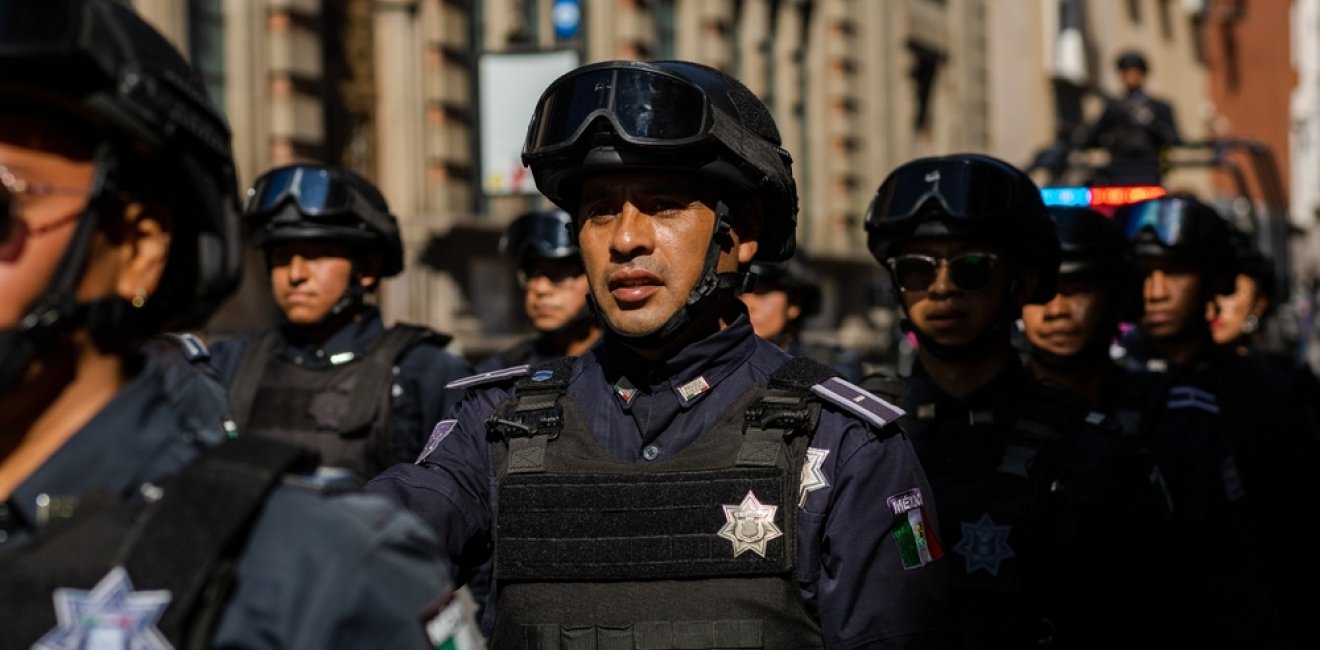Mexico remains in a prolonged period of security instability. The greatest challenge facing the current political regime is alleviating the country and regaining territorial control, which various criminal organizations have contested. This happens amid profound changes and transformations in the political regime and the Constitution.
Below is a brief analysis of the recent constitutional reforms, their impacts on the Mexican government’s security strategy, and the implications for the bilateral security relationship between Mexico and the United States.
Constitutional Reform: A Significant Shift in the Security Model
Mexico is transitioning to a centralized security model characterized by a civil-military institutional framework. The federal government is increasingly consolidating legal authority, responsibilities, and budgetary control over states and municipalities. The Secretariat of Security and Citizen Protection (SSPC) has become a key institution, acquiring new powers and capabilities that enable the Federal Executive Branch to oversee resources, criminal investigations, and intelligence for national security.
Recent reforms to Article 21 of the Mexican Constitution1 and the Organic Law of the Federal Public Administration2 mark a critical shift in the institutional framework for public and national security. The SSPC and its leadership now centralize and coordinate intelligence generated by civil and military agencies. Additionally, the SSPC has been granted authority to investigate crimes in collaboration with the Public Prosecutor's Office—a role it shares with the National Guard (GN) and local police forces.
The SSPC is responsible for developing and leading the National Public Security Strategy and public security programs and policies. It also coordinates and leads joint operations with all public security institutions nationwide. Working alongside the Attorney General’s Office (FGR), it executes arrest warrants with the support of the armed forces, including the GN. The National Guard, no longer under the SSPC, has been transferred to the Secretariat of National Defense (SEDENA). As per the constitutional reform of September 30, 2024, the National Guard is nth a public security force and a new branch of the armed forces3.
A new Subsecretariat for Intelligence and Police Investigation has been established to fulfill these responsibilities and lead the country’s security and intelligence efforts. It appears that the National Intelligence Center (CNI) will be reoriented to focus more on public and internal security intelligence at the expense of national security priorities.
Through the Executive Secretariat of the National Public Security System, the federal government will gain greater control over states and municipalities in security matters. Having the authority to establish guidelines, standardize protocols, audit, and oversee the allocation of resources will ensure compliance with the operational functions of public security institutions and police forces at both state and municipal levels.
This redesign aims to strengthen the Mexican government’s capacity to combat organized crime, which has infiltrated hundreds of local police forces and corrupted municipal governments. By integrating intelligence into criminal investigations, the goal is to prosecute cases based on information from both civil and military agencies. An example of this new “coordination” is the recent “Operación Enjambre” (“Swarm“ Operation) conducted on November 22, 2024, in the State of Mexico. Using shared intelligence, authorities arrested 24 public officials, including a municipal president and several directors of public security from 12 municipalities. These individuals were linked to criminal organizations such as the Cartel Jalisco Nueva Generación and La Familia Michoacana.
With these new powers, the SSPC has become a kind of super-ministry, resembling a hybrid between an Office of National Intelligence and a Department of Justice. It leads intelligence integration and investigates and executes arrest warrants but does not have prosecutorial authority. In theory, this model could enhance the effectiveness of security operations by allowing the SSPC to take an active and strategic role. However, its implementation raises questions about potential challenges and repercussions.
Centralization may impact Mexico’s security strategy by increasing tensions among the country’s security agencies, which have historically operated autonomously with varying levels of coordination. Potential risks include the growing militarization of public security policies and blurring lines between public and national security—issues that could provoke resistance from civil institutions and national and international human rights organizations.
Finally, Mexico’s security redesign will likely impact its relationship with the United States by reconfiguring cooperation channels. This has already generated tensions over intelligence sharing and is expected to highlight differences in security approaches further. The centralization of the SSPC and its operational reliance on the armed forces have raised concerns among US security agencies about Mexico’s ability to address critical issues such as the increasing influence of organized crime and border security. These dynamics have complicated operational collaboration, particularly in sensitive areas such as fentanyl trafficking, arms smuggling, and human trafficking. As a result, a recalibration of objectives and protocols between the two countries will be necessary to strengthen strategic cooperation.
[1] Initiative presented by the President of Mexico, Dr. Claudia Sheinbaum Pardo, before the Senate of the Republic on October 30, 2024.
[2] DECREE amending, supplementing, and repealing various provisions of the Organic Law of the Federal Public Administration. Published in the Official Gazette of the Federation on November 28, 2024.
[3] DECREE amending and supplementing Articles 13, 16, 21, 32, 55, 73, 76, 78, 82, 89, 123, and 129 of the Political Constitution of the United Mexican States, concerning the National Guard. Published in the Official Gazette of the Federation on September 30, 2024.
Author


Mexico Institute
The Mexico Institute seeks to improve understanding, communication, and cooperation between Mexico and the United States by promoting original research, encouraging public discussion, and proposing policy options for enhancing the bilateral relationship. A binational Advisory Board, chaired by Luis Téllez and Earl Anthony Wayne, oversees the work of the Mexico Institute. Read more

Explore More
Browse Insights & Analysis
The OSCE is a Good Value for America



